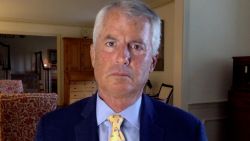Rep. Zoe Lofgren, a member of the House panel investigating the January 6, 2021, insurrection, on Sunday called out former President Donald Trump for featuring a speaker during his Saturday rally who highlighted the plight of a January 6 rioter and alleged Nazi sympathizer who was convicted on all five charges he faced in May.
“When President Biden warned there are some elements in this extreme group that are semi-Fascist, maybe he didn’t need to use ‘semi,” the California Democrat told CNN’s Jim Acosta on “Newsroom,” referring to the current President’s recent remarks about “MAGA Republicans.”
Biden in late August rebuked Republicans who have stuck to the credo of his predecessor, labeling it “semi-fascism.”

The speaker at Trump’s Pennsylvania rally was Cynthia Hughes, the leader of a support group for January 6 defendants like Timothy Hale-Cusanelli, whose case went viral after the Justice Department released photos of him sporting a distinctive “Hitler mustache.”
Trump’s decision to feature a speaker highlighting such a case, when there are hundreds of other Capitol riot defendants to cite as examples, prompted a pointed response from Lofgren, also a member of the House Judiciary Committee: “Being a supporter of Adolf Hitler does put you in the Fascist category; there is no semi about it. I do think this is troubling.”
Signaling support for Capitol rioters was just one example of how Trump used his first rally since the FBI search of Mar-a-Lago to pander to his base, railing against Biden, whom he called an “enemy of the state,” the FBI and Justice Department, and only briefly touting the Pennsylvania Senate and gubernatorial candidates he was in Wilkes-Barre to campaign for. The rally came just days after the former President said he would “very, very seriously” consider full pardons for Capitol rioters if he runs in 2024 and wins.
During the Saturday rally, Hughes pointed to the fact that Hale-Cusanelli, whom she called her nephew, had been kept in jail since his arrest nearly two years ago as an example of what she called the broader injustice facing defendants in January 6-related cases. While true that Hale-Cusanelli was not charged with any violent crimes, the judge in his case decided he should remain in jail while he awaited trial because he posed a threat to the public and that there was a potential for an “escalation of violence” from his alleged long-held neo-Nazi beliefs.
“I am very concerned about the statements after January 6 suggesting that the defendant is looking forward to a civil war,” federal Judge Trevor McFadden said at a court hearing roughly two months after Hale-Cusanelli’s arrest in January 2021.
“Every judge is afraid of releasing somebody who then goes crazy,” McFadden, a Trump appointee, said during the March 2021 hearing. “There’s a lot in here that makes me worried about that.”
Prosecutors had brought up police reports from 2020 where Jewish people accused Hale-Cusanelli of harassment. They said they were worried he might go after an informant who gave the FBI information that helped their case. And they mentioned that some coworkers at the Navy base where he worked in New Jersey felt afraid to confront him about his racist and sexist comments.
During his May trial, prosecutors played video of Hale-Cusanelli yelling a sexist slur at a female police officer during the riot and played audio and showed text messages from the defendant where he expressed anti-Semitic views, accusing Jewish people of controlling Biden, and said he wanted civil war.
Hale-Cusanelli, who claimed he didn’t know Congress met at the United States Capitol, has denied being a member of any White supremacist groups. He testified that he is half Jewish and half Puerto Rican – and that his racist slurs were always meant to be “ironic” and “self-deprecating humor.”
A jury convicted him on all counts earlier this year and he’ll be sentenced later this month.
He was the fifth January 6 rioter to be convicted by a jury in Washington, DC, and faces up to 20 years behind bars for the felony of obstructing an official proceeding. The ultimate sentence, however, will likely be far lower.
























